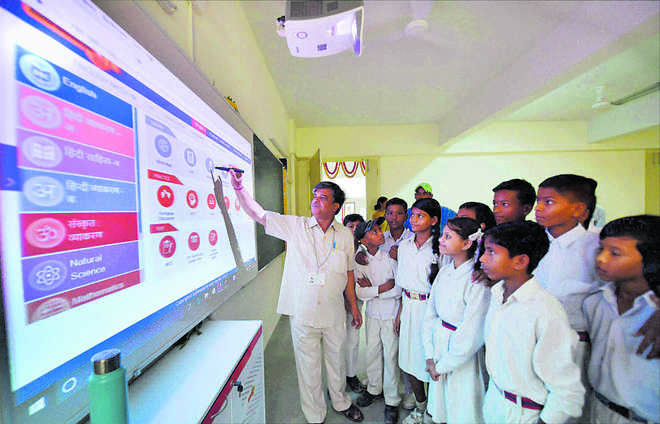
Revamping lessons: A teacher and students at a smart classroom in a government school that was inaugurated under the East Kidwai Nagar Redevelopment project in New Delhi. PTI
Manoj Kumar Tiwary & Sanjay Kumar
WHEN India backed out of the Programme for the International Student Assessment (PISA) in 2012 after ranking 69th out of 70 participating countries in 2009, the media reported this withdrawal, but did not give the underlying issues the deserved attention. The bad results of the PISA test in India reflected on the learning achievement of elementary education students, since it was held among 15-16 year olds who just passed out of elementary school. Neither the media, nor the government, paid much attention to why the participating students, with eight years of elementary education behind them, scored so poorly. The government avoided the underlying issue of student learning assessment by withdrawing from the PISA 2012, citing language unfamiliarity and context-independent tests as reasons.
So far the exclusive focus has been on the input components of elementary education, while ignoring the output angle, that is optimum learning achievement through the provision of quality education. Several qualitative research studies, supported by anecdotal evidence, have brought to the fore various variables that are responsible for the disappointing learning achievements. Quantitative field researches gathered from rich samples also show that despite concerted efforts and inputs designed to improve the learning outcomes, we are still a long way from attaining optimal learning levels.
Poor learning levels of elementary school children are due to the social, economic and educational backgrounds of their families; linguistic problems caused by a student's multilingual engagement at home (local languages and dialects) and the medium of instruction at school (Hindi, English or official regional languages). Also, the teachers' backgrounds, beliefs, expectations and motivation; the teachers' unsatisfactory pedagogical skills and content knowledge due to the lack of appropriate and context-relevant training programmes. Children from different segments of society face different problems at school. It is, therefore, essential to disaggregate research data in order to understand the reasons for variance of the performance levels of different student segments. Children from marginalised communities lack the social and cultural capital needed to take advantage of what school can offer them. They are often first-generation learners and, unlike their more privileged classmates, cannot count on their families' help with schoolwork. Linguistic problems add to their disadvantage. In most states, there exists little similarity between classroom languages like Hindi, English or official regional languages and the home language or dialects of underprivileged students.
Marginalised students experience problems in comprehending what their teachers try to teach them and are further alienated by the content of textbooks, written in languages they have difficulties in understanding and referring to unfamiliar social and cultural contexts. India's cultural and linguistic diversity seldom finds expression through textbooks and other teaching materials, which are time and again limited to dominant cultural values and perspectives. Students from SCs, STs, Minorities and underprivileged communities continue to face the prejudices and disregard of their teachers and more privileged classmates.
Societal and linguistic problems are exacerbated by the pedagogical inaptitude of teachers, as well as their prejudiced mindset, reflecting socio-cultural biases. The majority of teachers lack the pedagogical and language skills, reflective capacity and socio-cultural sensitivity to enable inclusive learning. To improve the learning outcomes, teachers need to be sensitised. Teachers' personal attitudes towards disadvantaged children also need to change. These attitudes are, of course, shaped by societal values and practices and are not easy to modify without effective teacher education.
There is a shortage of effectual programmes that employ pedagogic pluralism to train pre-service and in-service teachers. Besides, changing teachers' pedagogic and personal outlook is not enough either. For our largely textbook-based educational system, it is also necessary to make textbooks more culturally and linguistically diverse, reflecting the heterogeneous identities of all students' in a classroom and not just favouring the values and experiences of dominant groups.
The Draft NEP 2016, recently published by the Ministry of Human Resources, is in preparation for the New Education Policy. The disparate level of education of disadvantaged children, in particular tribal children, is a special concern. The draft states that gender issues, social, cultural and regional disparities will be addressed in future curricula, with an emphasis on unity in diversity. It proposes to make social justice and legal measures part of the new curriculum in an attempt to confront social discrimination in the classroom. Without tackling these issues head-on, the goal of improving learning achievement among children from marginalised communities becomes even more difficult to achieve.
Inadequate initial professional preparation, and fragmented professional-development programmes for school teachers hamper an effective teaching-learning process. Teachers are ill-equipped to teach students with diverse socio-economic and cultural backgrounds. Successful teacher-education programmes depend on competent teacher educators. There is a shortage of professionally trained and qualified teacher educators. The draft focuses on the need for the new generation of teachers to be trained in modern pedagogies. Meticulous, country-wide data-collection and analysis of how social and cultural background constitutes learning groupings associated with poor or better learning achievements is needed. Or else, educationally advanced states too may find it hard to excel in the next PISA round and the most vulnerable students will continue to find themselves intentionally or inadvertently excluded.
The writers are associated with Deshkal Society, a Delhi-based research-based civil society organisation.



























